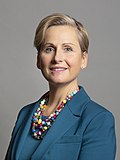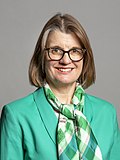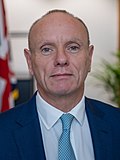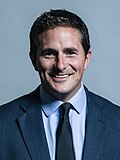| Minister (Cabinet members shown in bold) | Office | Date of resignation | Reason |
|---|
 | Rt Hon The Lord Agnew of Oulton DL | Minister of State for Efficiency and Transformation | 24 January | Unable to defend the government's track record on tackling fraud in Covid business schemes. [16] |
 | Angela Richardson MP | Parliamentary Private Secretary to the Department for Levelling Up, Housing and Communities | 31 January | Criticised Boris Johnson for his mishandling of the partygate affair. [17] |
 | Rt Hon The Lord Wolfson of Tredegar QC | Parliamentary Under-Secretary of State for Justice | 13 April | Accused Boris Johnson of undermining the rule of law, following his decision not to resign in response to criminal sanctions imposed on him by the Metropolitan Police. [18] |
 | Paul Holmes MP | Parliamentary Private Secretary to the Home Office | 27 May | Concerns around "toxic culture" at the heart of government following the publication of the Sue Gray report. [19] |
 | John Lamont MP | Parliamentary Private Secretary to the Foreign, Commonwealth and Development Office | 6 June | Resigned in order to vote against Boris Johnson in a vote of confidence as leader of the Conservative Party. [20] |
 | Rt Hon Oliver Dowden CBE MP | Chairman of the Conservative Party
Minister without Portfolio | 24 June | Resigned over poor results at the Tiverton and Honiton and Wakefield by-elections. [21] |
 | Rt Hon Chris Pincher MP | Government Deputy Chief Whip
Treasurer of the Household | 30 June | Reports that he drunkenly groped two men at the Carlton Club on 29 June. [22] |
 | Rt Hon Sajid Javid MP | Secretary of State for Health and Social Care | 5 July | An historic mass resignation (the largest number of ministerial resignations in a 24-hour period, more than tripling the previous record of 11 resignations, set in 1932 during the 2nd National Government), [23] following a statement by the Prime Minister, in which he confirmed that he had been aware of sexual misconduct allegations against Chris Pincher before appointing him to the government. [24] [a] This contributed to the resignation of Johnson as leader of the Conservative Party and later Prime Minister, with him replaced by Liz Truss as party leader on 5 September and as prime minister the following day. [25] |
 | Rt Hon Rishi Sunak MP | Chancellor of the Exchequer |
 | Saqib Bhatti MBE MP | Parliamentary Private Secretary to the Department for Health and Social Care |
 | Jonathan Gullis MP | Parliamentary Private Secretary to the Northern Ireland Office |
 | Nicola Richards MP | Parliamentary Private Secretary to the Department for Transport |
 | Virginia Crosbie MP | Parliamentary Private Secretary to the Office of the Secretary of State for Wales |
 | Alex Chalk QC MP | Solicitor General for England and Wales |
 | Will Quince MP | Parliamentary Under-Secretary of State for Children and Families | 6 July |
 | Laura Trott MP | Parliamentary Private Secretary to the Department for Transport |
 | Robin Walker MP | Minister of State for School Standards |
 | John Glen MP | Economic Secretary to the Treasury |
 | Felicity Buchan MP | Parliamentary Private Secretary to the Department for Business, Energy and Industrial Strategy |
 | Victoria Atkins MP | Minister of State for Prisons and Probation |
 | Jo Churchill MP | Parliamentary Under-Secretary of State for Agri-Innovation and Climate Adaption |
 | Stuart Andrew MP | Minister of State for Housing |
 | Selaine Saxby MP | Parliamentary Private Secretary to HM Treasury |
 | David Johnston MP | Parliamentary Private Secretary to the Department for Education |
 | Claire Coutinho MP | Parliamentary Private Secretary to HM Treasury |
 | Lee Rowley MP | Parliamentary Under-Secretary of State for Business and Industry |
 | Kemi Badenoch MP | Minister of State for Local Government, Faith and Communities
Minister of State for Equalities |
 | Neil O'Brien MP | Parliamentary Under-Secretary of State for Levelling Up, The Union and Constitution |
 | Alex Burghart MP | Parliamentary Under-Secretary of State for Apprenticeships and Skills |
 | Julia Lopez MP | Minister of State for Media, Data, and Digital Infrastructure |
 | Mims Davies MP | Parliamentary Under-Secretary of State for Employment |
 | Duncan Baker MP | Parliamentary Private Secretary to the Department for Levelling Up, Housing and Communities |
 | Craig Williams MP | Parliamentary Private Secretary to HM Treasury |
 | Mark Logan MP | Parliamentary Private Secretary to the Northern Ireland Office |
 | Rachel Maclean MP | Parliamentary Under-Secretary of State for Safeguarding |
 | Mike Freer MP | Parliamentary Under-Secretary of State for Exports |
 | Mark Fletcher MP | Parliamentary Private Secretary to the Department for Business, Energy and Industrial Strategy |
 | Sara Britcliffe MP | Parliamentary Private Secretary to the Department for Education |
 | Ruth Edwards MP | Parliamentary Private Secretary to the Office of the Secretary of State for Scotland |
 | Peter Gibson MP | Parliamentary Private Secretary to the Department for International Trade |
 | James Sunderland MP | Parliamentary Private Secretary to the Department for Environment, Food and Rural Affairs |
 | Jacob Young MP | Parliamentary Private Secretary to the Department for Levelling Up, Housing and Communities |
 | Rt Hon Michael Gove MP [a] | Secretary of State for Levelling Up, Housing and Communities |
 | James Daly MP | Parliamentary Private Secretary to the Department for Work and Pensions |
 | Danny Kruger MBE MP | Parliamentary Private Secretary to the Department for Levelling Up, Housing and Communities |
 | Rt Hon Simon Hart MP | Secretary of State for Wales |
 | Edward Argar MP | Minister of State for Health |
 | Gareth Davies MP | Parliamentary Private Secretary to the Department of Health and Social Care |
 | James Davies MP | Parliamentary Private Secretary to the Department of Health and Social Care |
 | Rt Hon Brandon Lewis CBE MP | Secretary of State for Northern Ireland | 7 July |
 | Helen Whately MP | Exchequer Secretary to the Treasury |
 | Rt Hon Damian Hinds MP | Minister of State for Security and Borders |
 | George Freeman MP [b] | Parliamentary Under-Secretary of State for Science, Research and Innovation |
 | Guy Opperman MP | Parliamentary Under-Secretary of State for Pensions and Financial Inclusion |
 | Chris Philp MP | Parliamentary Under-Secretary of State for Tech and the Digital Economy |
 | James Cartlidge MP | Parliamentary Under-Secretary of State for Justice |
 | Rt Hon Michelle Donelan MP | Secretary of State for Education |
 | Rob Butler MP | Parliamentary Private Secretary to the Foreign, Commonwealth and Development Office |
 | Rebecca Pow MP [c] | Parliamentary Under-Secretary of State for Nature Recovery and the Domestic Environment |
 | Jack Brereton MP | Parliamentary Private Secretary to the Secretary of State for International Trade |
 | Fay Jones MP | Parliamentary Private Secretary to the Leader of the House of Commons |
 | Rt Hon The Lord Grimstone | Minister of State for Investment | Quit because Johnson had decided to leave Number 10 rather than fighting to remain in his post [28] |
 | Rt Hon The Lord Greenhalgh | Minister of State for Building Safety and Fire | 8 July | Stated "now that the die has been cast I have decided that this is the right time for me to resign" [29] |
| Rt Hon The Lord Harrington | Minister of State for Refugees | 4 September | Resigned from government prior to the announcement of the result of the July–September 2022 Conservative Party leadership election [30] |
 | Rt Hon Nigel Adams MP | Minister of State without Portfolio | 5 September | Announced that they did not intend to serve in the incoming government [31] |
















































































